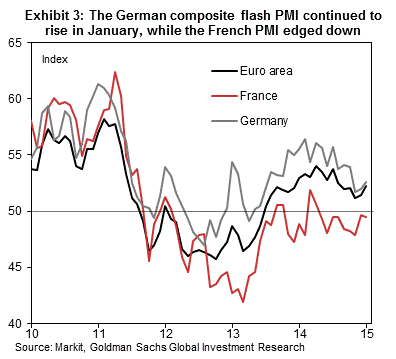Today’s market action is largely a continuation of the QE relief rally, where – at least for the time being – the market bought the rumor for over 2 years and is desperate to show it can aslo buy the news. As a result, the European multiple-expansion based stock ramp has resumed with the Eurostoxx advancing for a 7th day to extend their highest level since Dec. 2007. As we showed yesterday, none of the equity action in Europe is based on fundamentals, but is the result of multiple expansion, with the PE on European equities now approaching 20x, a surge of nearly 70% in the past 2 years.
But the real story is not in equities but in bonds where the perfectly expected frontrunning, as well as backrunning, of some €800 billion in European debt issuance over the next year, taking more than 100% of European net supply, has hit new record levels perfectly expected frontrunning:
- YIELD ON US 10Y DROPS 6BPS TO 1.80%
- GERMAN 10 YEAR BOND YIELD DROPS TO RECORD LOW 0.37%
- BELGIAN 10 YEAR BOND YIELD DROPS TO RECORD LOW 0.685%
- FRENCH 10 YEAR BOND YIELD FALLS TO RECORD LOW 0.585%
- SPANISH 10 YEAR BOND YIELD DROPS TO RECORD LOW 1.365%
- ITALIAN 10 YEAR BOND YIELD DROPS TO RECORD LOW 1.512%
- HUNGARIAN 10 YEAR BOND YIELD DROPS TO RECORD LOW 2.92%
- POLISH 10 YEAR BOND YIELD FALLS TO RECORD LOW 2.06%
The rush into risk is further facilitates by the crashing Euro which has just tumbled below 1.12 , the lowest level in 11 years, and is now sure to lead to major FX losses for US multinationals, as well as a collapse in Chinese exports, further intensifying the global deflationary wave.
Perhaps just as notable is that following yesterday’s expected, but still surprising, announcement of 91-year-old King Abdullah’s death, which sent Brent briefly higher, the crude complex has come back down to earth after his successor, Prince Salman, said he would maintain policies on oil. To think: just 6 months ago the Saudi news would have likley sent the oil complex limit up…
Over in Asia, stock markets rose across the board following suit from sharp rallies across the globe after the ECB’s larger-than-expected QE announcement. The Nikkei 225 (+1.05%) traded close to 1-month high although unable to finish around best levels weighed by a modest JPY rebound. Shanghai Comp (+0.25%) and Hang Seng (+1.3%) were further bolstered by a better than Exp. Chinese HSBC Flash Mfg. PMI (49.8 vs. Exp. 49.5 (Prev. 49.6), despite the number showing the 2nd consecutive month of contraction.
As noted above, European equities (Eurostoxx50 +1.43) reside firmly in the green in a continuation of yesterday’s gains following the larger than expected ECB quantitative easing programme which is providing support for the DAX, currently trading near record highs. However, Italian banks remain under pressure weighing on the FTSE MIB following news today that the Populari banks’ lobby will oppose new legislation imposing change into joint-stock companies. In Fixed income, the unveiling of the sovereign bond programme has led to Eurozone bond yields continuing to print fresh record lows with the bund future up 87 ticks heading into the North American session, with T-notes up 19 ticks in sympathy with the move. Of note, the Prelim Barclays month end extensions for US Treasury is at +0.09y (Prev. +0.09yrs).
European risk got a modest tailwind from today’s flash PMI report, which was fractionally better than expected, with the manufacturing PMI rising to 51.0 from 50.6, the highest in 6 months. Goldman explains:“The Euro area composite PMI rose from 51.4 to 52.2 in January, more than our and consensus expectations of a smaller increase (Cons: 51.7, GS: 51.6). The expansion in the composite PMI was driven by a 0.7pt increase in the services component to 52.3 and by a 0.4pt rise in the manufacturing component to 51.0. The German composite PMI continued to rise, by 0.6pt to 52.6, while the French composite PMI fell back by 0.2pt to stand at 49.5.
In addition to the Euro area aggregate PMI, Flash PMIs were released for Germany and France. The German composite PMI came in stronger than expected at 52.6 in January (Cons: 52.4). The 0.6pt increase in the services PMI (to 52.7) more than offset the 0.2pt contraction in the manufacturing component. The German composite PMI has been volatile in the past year and declined during 2014 as a whole but, in the past three months it has displayed positive momentum. By contrast, the French composite PMI declined by 0.2pt to 49.5, against consensus expectations of a small increase (Cons: 50.1). While the French manufacturing PMI expanded by a notable 2.0pt (to 49.5), the French services PMI lost 1.1pt (to 49.5). The French manufacturing PMI has been below the 50 mark for 9 consecutive months, pointing to lingering weaknesses.
As also noted previously, WTI (+1.2%) and Brent crude (+1.9%) futures traded higher overnight following news of the death of King Abdullah, who was an advocate for lower prices. However, oil prices have since pulled away from best levels throughout the morning due to reports that his successor Prince Salman would maintain policies on oil. Elsewhere, copper (-1.8%) prices fell after speculation over aggressive Chinese hedge fund selling and China’s second contractionary PMI reading also weighing on the base metal.


